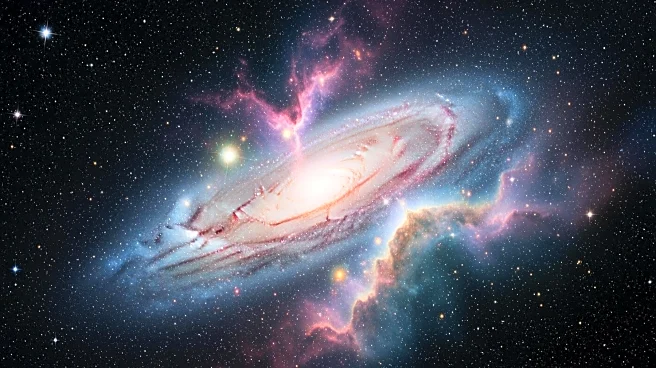What's Happening?
Recent discussions among scientists have focused on the potential end scenarios for the universe, which was born approximately 13.8 billion years ago from the Big Bang. The universe's fate is a subject
of debate, with three primary scenarios being considered: the Big Freeze, the Big Rip, and the Big Crunch. The Big Freeze suggests a gradual decline in energy, leading to a cold, dark universe. The Big Rip posits that the universe could expand so rapidly that it tears itself apart. The Big Crunch theorizes a reversal of expansion, collapsing the universe back into a singularity. These scenarios depend on the cosmological constant, a value that influences the universe's expansion rate.
Why It's Important?
Understanding the universe's potential end has significant implications for cosmology and physics. It challenges scientists to refine their models of the universe's structure and behavior. The cosmological constant, a key factor in these scenarios, remains a mystery, with its true nature and value still under investigation. This research could lead to breakthroughs in understanding dark energy, a major component of the universe's mass-energy content. The outcomes of these studies could reshape our comprehension of fundamental physics and the universe's long-term evolution, impacting future scientific and philosophical inquiries.
What's Next?
Further research is needed to determine the precise value and behavior of the cosmological constant. Observations of distant supernovae and cosmic microwave background radiation will continue to provide data to refine these models. Scientists aim to reconcile discrepancies between theoretical predictions and observed values, particularly concerning dark energy. As technology advances, new instruments and methods may offer deeper insights into the universe's expansion and ultimate fate. The scientific community remains focused on these questions, with potential discoveries that could alter our understanding of the cosmos.
Beyond the Headlines
The exploration of the universe's end raises philosophical and existential questions about humanity's place in the cosmos. It challenges our understanding of time, space, and existence itself. The potential for a cyclical universe, as suggested by the Big Crunch, introduces the idea of eternal recurrence, where the universe could be reborn in a new Big Bang. These concepts push the boundaries of human thought and inspire both scientific and cultural reflections on the nature of reality.









